Book 8_U4_语法
新译林版英语八年级下册Unit4Grammar
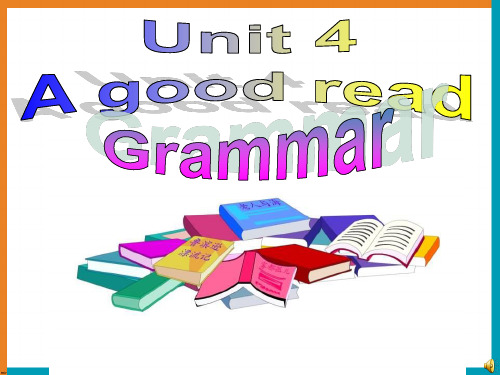
√ Suzy will explain Gulliver’s Travels
He didn’t know where he could find other people. He didn’t know w_h_e_r_e_ t_o_ f_i_n_d_ o_t_h__e_r _p_e_o_p_l_e_. He didn’t know how he could break the ropes.
forget, understand, see, hear, ask, advise, explain, find out等。
All question words can be used in this way, except “why”
× Suzy will explain why to recommend
V+疑问词+n+ to do
what which whose how many/how much
Eg: 我们还没决定住哪个房间。
We haven’t decided which room to live in. 他们在讨论暑假去几个地方游玩。
They are discussing how many places to 1visit in the summer holiday.
It but also says which bus to take. 1.They are discussing which colour to paint the walls. 2.You can ask your parents how much money to take with you .
computer to draw.
5.Don’t forget to tell your mum where to meet you (在哪里见你) .
Book 8 Unit 4.docx
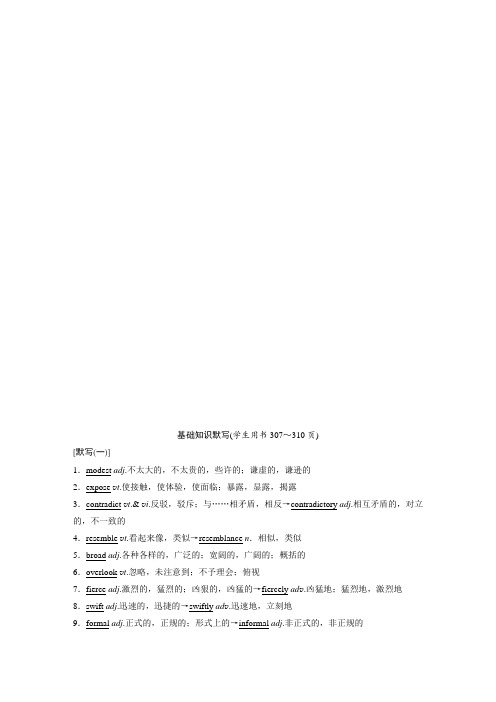
基础知识默写(学生用书307~310页)[默写(一)]1.modest adj.不太大的,不太贵的,些许的;谦虚的,谦逊的2.expose v t.使接触,使体验,使面临;暴露,显露,揭露3.contradict v t.& v i.反驳,驳斥;与……相矛盾,相反→contradictory adj.相互矛盾的,对立的,不一致的4.resemble v t.看起来像,类似→resemblance n.相似,类似5.broad adj.各种各样的,广泛的;宽阔的,广阔的;概括的6.overlook v t.忽略,未注意到;不予理会;俯视7.fierce adj.激烈的,猛烈的;凶狠的,凶猛的→fiercely ad v.凶猛地;猛烈地,激烈地8.swift adj.迅速的,迅捷的→swiftly ad v.迅速地,立刻地9.formal adj.正式的,正规的;形式上的→informal adj.非正式的,非正规的10.tiresome adj.讨厌的,令人厌烦的11.sincere adj.真诚的,诚挚的→sincerely ad v.真诚地12.tense adj.令人紧张的;神经紧张的;绷紧的,不松弛的→tensely ad v.紧张地13.evil adj.邪恶的,罪恶的n.邪恶,罪恶14.preference n.偏爱,偏好15.congratulation n.祝贺,恭喜16.criterion n.(评判的)标准,准则,原则17.restriction n.限制,约束18.boycott v t.拒绝购买(或使用、参加),抵制19.representative n.代表20.biography n.传记,传记作品21.deliberately ad v.故意地22.conquer v t.征服;占领;战胜,克服23.institution n.机构;制度24.attraction n.吸引人的特征;有吸引力的地方;吸引,吸引力→attract v t.吸引→attractive adj.有魅力的;有吸引力的25.disappoint v t.使失望,使扫兴→disappointed adj.感到失望的,感到沮丧的→disappointing adj.令人失望的→disappointment n.失望,沮丧;令人失望的人或事26.finance v t.给……提供经费n.财政,金融;资金→financial adj.财政的,财务的;金融的27.shoot v t.& v i.拍摄;射击;打猎;射门,投篮n.拍摄,摄影;幼苗,嫩芽28.robbery n.抢劫→rob v t.抢劫,掠夺,盗取→robber n.抢劫者,强盗29.accumulate v t.&v i.积累,积聚;逐渐增加→accumulation n.积累,积聚30.parallel adj.平行的;相似的n.相似的人或事物;相似特征[默写(二)]1.in defence of为……辩护;防卫,保卫2.point out指出3.make restrictions on对……作出限制4.expose sb.to sth.使某人接触/体验某事5.have access to有……的权利/机会;得以接近/进入……6.be responsible for对……负责7.show off炫耀,卖弄8.give thought to认真考虑,思考9.regardless of不管,不顾10.be devoted to致力于,献身于11.in the minority占少数12.refer to提到;参考;指的是13.be aware of知道;意识到14.have a tendency to有……的倾向15.view...as...把……看作16.at the end of在……的末端,在……结束时17.in this case在这种情况下18.pay attention to注意19.We make no restrictions on the kinds of films we show—as long as a film’s quality meets our standards,we include it.我们对我们所放映的电影的种类不作限制——只要影片的质量符合我们的标准,就接纳它。
Book 8 Unit 4
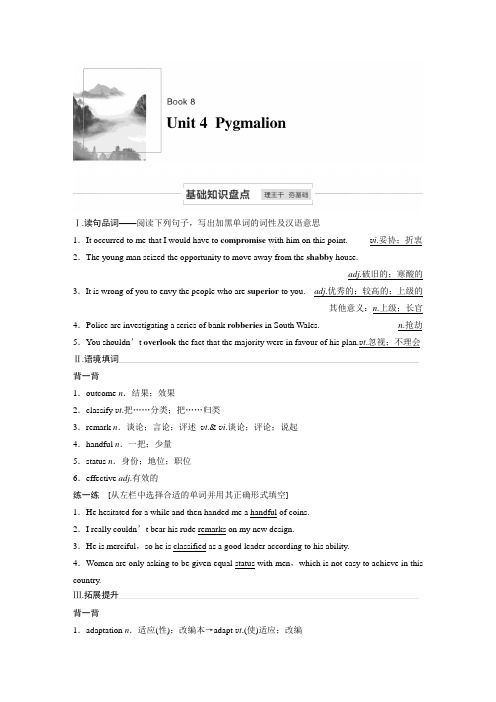
Ⅰ.读句品词——阅读下列句子,写出加黑单词的词性及汉语意思1.It occurred to me that I would have to compromise with him on this point. v i.妥协;折衷2.The young man seized the opportunity to move away from the shabby house.adj.破旧的;寒酸的3.It is wrong of you to envy the people who are superior to you. adj.优秀的;较高的;上级的其他意义:n.上级;长官4.Police are investigating a series of bank robberies in South Wales. n.抢劫5.You shouldn’t overlook the fact that the majority were in favour of his plan.v t.忽视;不理会Ⅱ.语境填词背一背1.outcome n.结果;效果2.classify v t.把……分类;把……归类3.remark n.谈论;言论;评述v t.& v i.谈论;评论;说起4.handful n.一把;少量5.status n.身份;地位;职位6.effective adj.有效的练一练[从左栏中选择合适的单词并用其正确形式填空]1.He hesitated for a while and then handed me a handful of coins.2.I really couldn’t bear his rude remarks on my new design.3.He is merciful,so he is classified as a good leader according to his ability.4.Women are only asking to be given equal status with men,which is not easy to achieve in this country.Ⅲ.拓展提升背一背1.adaptation n.适应(性);改编本→adapt v t.(使)适应;改编2.hesitate v i.犹豫;踌躇→hesitation n.犹豫;踌躇3.mistaken adj.(见解或判断上)错误的;不正确的→mistake v t.误会;误解n.错误;过失;误会4.fortune n.机会;运气;大笔的钱→fortunate adj.幸运的;侥幸的5.rob v t.抢劫;盗窃;剥夺→robber n.强盗→robbery n.抢劫6.musical adj.音乐的;喜爱音乐的n.音乐喜剧→musician n.音乐家7.disgusting adj.使人反感的;令人厌恶的→disgusted adj.厌恶的;厌烦的→disgust v t.使作呕;使厌恶n.作呕;厌恶练一练[用所给单词的正确形式填空]1.A musician is a person who plays a musical instrument as his job or hobby.(music) 2.Fortunately,I worked with some brilliant directors and made a large fortune.(fortune) 3.Some people were cautious and hesitated to help,but the young man jumped into the river without hesitation.(hesitate)4.The film was adapted from a short novel and the director was satisfied with the adaptation.(adapt)5.It’s disgusting(disgust) that he interrupted me from time to time while I was working.Ⅳ.选词填空背一背1.pass...off as...(把某人)改变或冒充成……2.make one’s acquaintance结识;与……相见3.generally speaking一般来说4.in terms of...就……来说;从……角度5.rob sb.of sth.抢劫某人某物6.in amazement震惊;惊讶7.show...in带或领……进来8.once more再一次9.in need of...需要……10.fade out(声音、画面)逐渐模糊;渐淡练一练[从左栏中选择合适的短语并用其正确形式填空]1.As the program ended,the music slowly faded out and someone began to speak.2.When the volunteers got there,they set out to help those who were in need of help at once. 3.When I called up the patient once more,he told me that he was in good condition. 4.Generally speaking,an easy-going person is more likely to team up with others.5.A great many employees told me that the job was satisfactory in terms of salary.6.He is a friendly and kind man and I am thankful for the opportunity to have made his acquaintance.Ⅴ.仿写运用背一背1.While watching,he makes notes.他边看边做笔记。
人教英语八年级上册u4知识点

人教英语八年级上册u4知识点人教英语八年级上册Unit 4知识点Unit 4 在人教版英语八年级上册中,是一个涉及音乐的单元,同学们需要学习与音乐相关的词汇、表达方式和句型,同时也需要掌握一些基本的语法知识。
在这篇文章中,我们将会为大家总结出 Unit 4 的重点知识点。
Section A1. music styles and instruments在这个单元的第一节课中,同学们需要学习到一些音乐类型,比如 rock, pop, jazz, blues, classical等等。
除此之外,你还需要掌握这些音乐类型所使用的一些乐器,比如电吉他、键盘、小提琴等等。
2. grammar:too + adj.另外,同学们还需要注意到一个语法结构,在这个单元中,我们学习到了 too + adj.这个结构的用法。
这个结构可以用来表达“太……了”、“过于……”的意思,例如:- The music is too loud. 这音乐太吵了。
- The movie is too boring. 这电影太无聊了。
Section B1. talking about music在第二节课中,我们需要学习一些用来谈论音乐的表达方式,包括表达自己喜欢的音乐、描述音乐的特点、评论音乐等。
以下是一些例句:- I love pop music. 我喜欢流行音乐。
- This song has a catchy melody. 这首歌曲有一个容易上口的旋律。
- The band played well. 这个乐队演奏得非常好。
2. grammar:comparative adjectives在这一课中,我们还需要学习比较级的用法,这个语法知识在英语学习中非常重要,而且经常被考察。
同学们需要关注以下这些点:- 一些形容词和副词的比较级需要进行改变,比如big - bigger, good - better等等。
- 一些词语在比较级结构中需要使用than,例如:She is taller than her friend.Section C1. describing music在第三节课中,我们需要学习如何描述音乐,比如节奏、旋律、歌词、歌手等等。
book8 unit4 反思
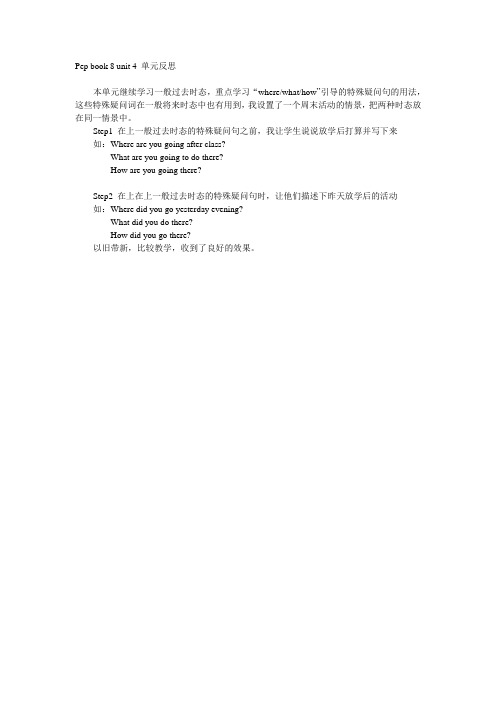
Pep book 8 unit 4 单元反思
本单元继续学习一般过去时态,重点学习“where/what/how”引导的特殊疑问句的用法,这些特殊疑问词在一般将来时态中也有用到,我设置了一个周末活动的情景,把两种时态放在同一情景中。
Step1 在上一般过去时态的特殊疑问句之前,我让学生说说放学后打算并写下来
如:Where are you going after class?
What are you going to do there?
How are you going there?
Step2 在上在上一般过去时态的特殊疑问句时,让他们描述下昨天放学后的活动
如:Where did you go yesterday evening?
What did you do there?
How did you go there?
以旧带新,比较教学,收到了良好的效果。
广州牛津深圳版英语八年级上册 Unit 4 同步 语法和拓展(有答案)

广州深圳牛津版八上U4 巩固提升训练(同步+语法+拓展训练)一.单元短语自查:(Do it by yourself !) 一.重点单词1. 单词拼写。
(1)The wheel is one of the greatest iin history.(2) After the wheel was invented, travelling became faster and c . (3) Thomas Edison d the first light bulb in 1879. (4)The bus stopped every few minutes to pick up p . (5) Your advice sound p . I’ll do as you said.(6) By chatting online, we can see the speakers over long d . (7)The modern city was only a small village in a times.(8) Cars make our life quite convenient, but they also c many problems. (9)When buying a book, it is necessary to read the i first. (10)The watch was given by my grandpa; so it is very s .inventions, comfortable ,developed, passengers, practical,distance, ancient, introduction, special ,二.重点短语互译1 自那时 2. daytime 3. off 4. keep in touch with 5.与此同时 6. millions of 7. the same...as 8.Live a better life 9. imagine doing sth. 10. 导致 促成 二.要点精讲精练①:help sb. (to) do sth. help sb. with sb. 即学即练:完成句子1.Tom 帮助他的弟弟做家庭作业。
人教版高中英语第八册第四单元语言知识点 B8U4 language points(共35张)
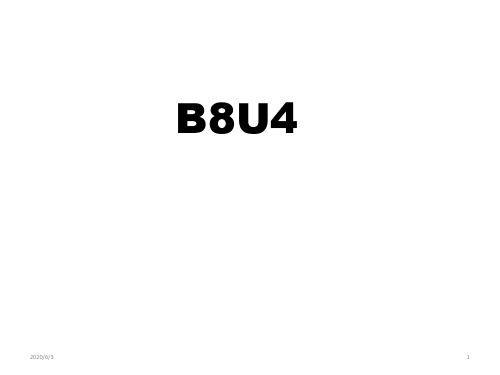
be convinced of/that/to do 确信
2020/6/3
8
【Translation】 (1)他令我相信他是无辜的。
He convinced me of his innocence.
(2) 我确信他有罪。 I am convinced of his guilt. I am convinced that he was guilty.
make one’s acquaintance
21. 一把…… a handful of
22. 惊谔地 in amazement/to one’s ~
2020/6/3
4
Unit 4 Language points
2
5
1. adaptation n. 适应(性);改编本 adapt v. ~ to 适应 / from改编
2020/6/3
6
2. classic adj. 经典的; 第一流的 n. 经典著作
_c_l_a_s_si_c_a_l____ adj.古典的
1) The novel may become a modern _c_l_a_s_s_ic_. 2) You have made a __c_l_a_s_s_ic_ mistake. 3)The little girl seems to enjoy _c_la_s_s_i_c_a_l
B8U4
2020/6/3
1
Difficult and important expressions in reading 1
2020/6/3
2
1.……的改编 an adaptation of classic…
2.雄心勃勃的 be ambitious to
book8 uint 4 知识点
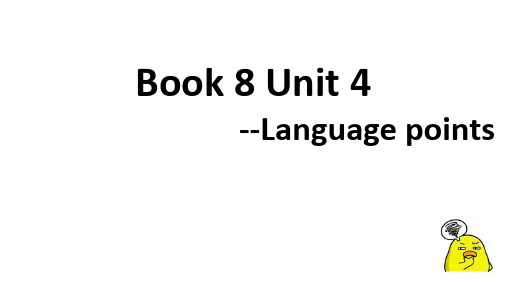
6. pass … off as… (把) 改变或冒充成……
In order to distinguish herself, the girl passed herself off as a well-known
film star.
为了给自己扬名,那个女孩冒充成一个著名的电影明星。
Review: pass 相关短语
由…改编
(1) He tried hard to adapt (himself) _t_o_____ the new school life.
(2)The new version has been ___a_d_a_p_t_e_d_(adapt) for a 4D film.
新的版本已经被改编成4D电影。
(1) He made a number of rude remarks about the food there. 他对那里的食物出作出了许多粗鲁的评论。
(2) The media remarked ___o_n____ the behavior of that singer. 媒体对那位歌手的表现作出了评论。
我在给他打电话之前还在犹豫是否支持他。
(4) Without ___h_e_s_i_ta_t_io__n(hesitate),he walked up to help the injured old woman.
3. classify vt. 把…分类;把…归类
be classified by/according to 根据…分类
(2)He was found guilty and condemned/sentenced to death. 他被裁定有罪并且判处死刑。
(3)In the classic film, the hero was condemned to a life of hardship. 在这部经典电影中,男主人公不得不过着艰难的生活。
- 1、下载文档前请自行甄别文档内容的完整性,平台不提供额外的编辑、内容补充、找答案等附加服务。
- 2、"仅部分预览"的文档,不可在线预览部分如存在完整性等问题,可反馈申请退款(可完整预览的文档不适用该条件!)。
- 3、如文档侵犯您的权益,请联系客服反馈,我们会尽快为您处理(人工客服工作时间:9:00-18:30)。
强调句强调是为了对一定语境下的部分内容进行突出而采取的一种修辞手法。
强调方式有很多种,主要是为了突出信息。
有些是语法上的需要,同时也对信息起到强调作用。
强调句的常见用法如下:1. 用强调句型:“It is(was)+被强调的部分+that(who)+原句其它部分”来强调说话人的意愿。
对主语进行强调:It was I that/who didn’t realize all my mistakes until you told meyesterday.对宾语进行强调:It was all my mistakes that I didn’t realize until you told me yesterday.对状语进行强调:It was not until you told me yesterday that I realized all my mistakes.2. 用助动词“do/does/did+动词原形”来表示强调:He does know the place well. 他的确很熟悉这个地方。
Do write to me when you get there. 你到那儿后务必给我来信。
3. 用形容词very,only,single,such等修饰名词或形容词来加强语气:That’s the very textbook we used last term. 这正是我们上学期用过的教材。
You are the only person here who can speak Chinese. 你是这里唯一会讲汉语的人。
Not a single person has been in the shop this morning.今天上午这个商店里连一个人都没有。
How dare you buy such expensive jewels? 你怎么敢买这么贵的宝石呢?4. 用ever,never,very,just等副词和badly,highly,really等带有-ly的副词来进行强调:Why ever did you do so? 你究竟为什么要这么做?He never said a word the whole day. 一整天,他一句话也没说。
You’ve got to be very, very careful. 你一定得非常、非常小心。
This is just what I wanted. 这正是我所要的。
He was badly wounded. 他伤得很严重。
I really don’t know what to do next. 我的确不知道下一步该怎么做。
5. 用in the world,on earth,at all等介词短语可以表达更强的语气(常用于疑问句):Where in the world could he be? 他到底会在哪儿?What on earth is it? 它究竟是什么?Do you know at all? 你到底知不知道?6. 用感叹句来表示强烈的感情,突出说话人的情感:How interesting a story it is! 这是一个多么有趣的故事啊!What a beautiful day! 多好的天气啊!7. 用倒装句(也就是将要强调的句子或被强调的部分置于句首)来加强语气:On the table were some flowers. 桌上摆着一些花。
(强调地点)Many a time have I climbed that hill. 我多次翻过那座山。
Only in this way, can we solve this problem. 只有这样,我们才能解决这个问题。
8. 用If来表示强调:1)If从句+I don’t know who/what, etc. does/is/has, etc.;主语部分也可以用nobody does/is/has, etc. 或everybody does/is/has, etc. 来代替(这里的if从句往往是正话反说,反话正说):If he can’t do it, I don’t know who can.要是他做不了这件事,我不知道还有谁能做。
(强调只有他能做)If Jim is a coward, everybody is.要是吉姆是个胆小鬼,那么人人都是胆小鬼。
(强调吉姆不是胆小鬼)2)if从句+it be主句(把所要强调的内容放在it be的后面,把其它内容放在由if引导的从句中):If anyone knew the truth, it was Tom. 如果说谁了解事实的真相,那便是汤姆。
If there is one thing he loves, it is money. 如果说世界上还有他爱的东西,那便是金钱。
强调的类型、结构及例句强调的类型、结构的相关训练强调句型的被强调成分及例句强调句型的注意点及例句强调句型的注意点的相关训练强调句型与定语从句等的比较强调句型与定语从句等的相关训练强调句与主语从句1) It is Maths ________ not all girls are good at.2) It is obvious ________ not all girls are good at Maths.A. thatB. whichC. whatD. /Keys: A Anot until 强调句与倒装句1) It was not until the teacher came close ______.2) Not until the teacher came close______.A. that he noticed herB. did he notice herC. that he didn’t notice herD. didn’t he notice her Keys: A B练习:一、单项选择:1. It will be three years ________ we get together again.A. thatB. whenC. sinceD. before2. It was through Xiao Li ____ I got to know Xiao Wang.A. whoB. whomC. howD. that3. It was in the rice fields ____ we had our league meeting.A. whereB. thatC. in whichD. on which4. It was on October 1st ____ new China was founded.A. whichB. whenC. asD. that5. Was it because he was ill ____ he asked for leave?A. andB. thatC. that’sD. so6. Mary speaks in a low voice; ____ is difficult to know what she is saying.A. itB. thatC. soD. she7. It was ____ I met Mr Green in Shanghai.A. many years thatB. many years beforeC. many years ago thatD. many years when8. ____ is not everybody ____ can draw so well.A. It, allB. It, thatC. There, whoD. There, that9. It’s the third time ____ I have been here.A. thatB. whenC. afterD. who10. It was simply for that reason ____ I w ouldn’t tell him the truth.A. whyB. whichC. soD. that11. —Was it in 1969 _____ the American astronaut succeeded _____ landing on the moon﹖— Quite right.A. when; onB. that; onC. when; inD. that; in12. It was _____ he said _____ disappointed me.A. what; thatB. that; thatC. what; whatD. that; what13. _____ is no possibility ______ Bob can win the first prize in the match.A. There; whetherB. It; thatC. There; thatD. It; whether14. —Where was you picked up the wallet﹖—Just near the school gate.A. itB. it thatC. the placeD. the place that15. I must find out why so many students made the same mistake.A. is it thatB. was it whichC. it is whatD. it was that16. is a fact that English is being accepted as an international language.A. ThereB. ItC. ThatD. This17. Our classroom is very clean. Do you know who cleaned it﹖A. was it thatB. it was thatC. was it whoD. he was18. Is it in the factory you visited last week this kind of car is made﹖A./;thatB. where;whenC. where;thatD./;when19. It was _____ 1920 regular radio broadcasts began.A. until; whenB. not until; whenC. until; thatD. not until; that20. It is ten years ________ Miss Gao returned to China.A. thatB. whenC. sinceD. as21. Was it in the place ____ the last emperor died?A. whereB. thatC. whichD. in which22. It ____ Mike and Mary who helped the old man several days ago.A. wasB. wereC. areD. had been23. He said, “____ a long way to school. ____ a long way to go ye t before we arrive.”A. It is, It isB. There is, There isC. There is, It isD. It is, There is24. It was about 600 years ago ____ the first clock with a face and an hour hand was made.A. thatB. untilC. beforeD. when25. It was not until she came to see us ____ her mother was ill in bed.A. when we knewB. that did we knewC. that we knewD. that did we know26. It was 20 years ago ________ the two friends met in Viet Nam.A. whenB. beforeC. sinceD. that27. It will be 20 years ________ they meet in Viet Nam.A. whenB. beforeC. sinceD. that28. It is 20 years ________ he came to live here.A. whenB. beforeC. sinceD. that29. It was not long ________ the people in Austria took up guns.A. whenB. beforeC. sinceD. that30. It was midnight _______ he came back home.A. whenB. beforeC. sinceD. that二、翻译句子。
